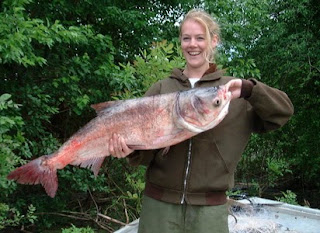The best way to fight the invasion of Asian carp may be to visit the fish counter at your local supermarket, if recommendations from the Asian Carp Marketing Summit come to pass. One conclusion from this gathering of experts is that filleting bighead and silver carp may prove a key tactic in the war against these fish.
Bighead and silver carp are thriving in the Mississippi and Illinois rivers, and as DNA traces and individual fish are found in or near Lake Michigan, concerns are high regarding the potentially devastating impact of these fish on the Great Lakes. The search is on for solutions.
“The summit was convened to identify obstacles and opportunities associated with commercial marketing of Asian carp as a way to reduce their numbers in the Mississippi River Basin, “ said Pat Charlebois, Illinois-Indiana Sea Grant (IISG) aquatic invasives specialist. This two-day event took place at the Lewis and Clark Community College in Godfrey, Illinois. It was organized by IISG, with sponsorship from the Illinois Department of Natural Resources (IDNR) and the National Great Rivers Research and Education Center.
Gathered together in one room were representatives from restaurants, commercial fishing, processing and related businesses, plus agencies, and academic institutions. Altogether, experts from eight states shared their insights and ideas.
“The tricky aspect about creating a marketing plan for an invasive species such as Asian carp is that we ideally want to eradicate them or at least greatly reduce their populations, so a sustainable fisheries is not the end goal,” said Kristin TePas, IISG aquatic invasives extension associate. “Because large-scale marketing has not been used like this before, we have to be careful how we proceed. There is not precedence for what we’re trying to achieve.”
The experts agreed that high value Asian carp fillets marketed to restaurants and retailers may provide the financial incentive for extensive harvesting of these fish. Looking to have immediate impact, they also recommended that whole fish be exported in high numbers to Asian markets, where these species are popular food fish. Because they are filter feeders, bighead and silver carp are regarded as tasty fish and are generally low in contaminants.
Finally, they recommended converting Asian carp by-products into pet food or treats to eliminate waste and maximize profit opportunities.
“Over the course of the two days, the participants came to a consensus on next steps needed to go forward,” said Charlebois. “They concluded that it’s necessary for people with different expertise, for example, natural resource professionals and entrepreneurs, to work together to successfully market Asian carp.
“Nonetheless, this process will ultimately be driven by those who make their livelihood from the market itself,” added Charlebois. “Natural resource agencies can play a role by reducing commercial fishing restrictions and protecting natural resources. Government agencies focused on business can help a company obtain funding. But, ultimately the success of this is in the hands of business people.”
When the final summit report is completed, a summary of recommendations will be available online and updated as information progresses.


